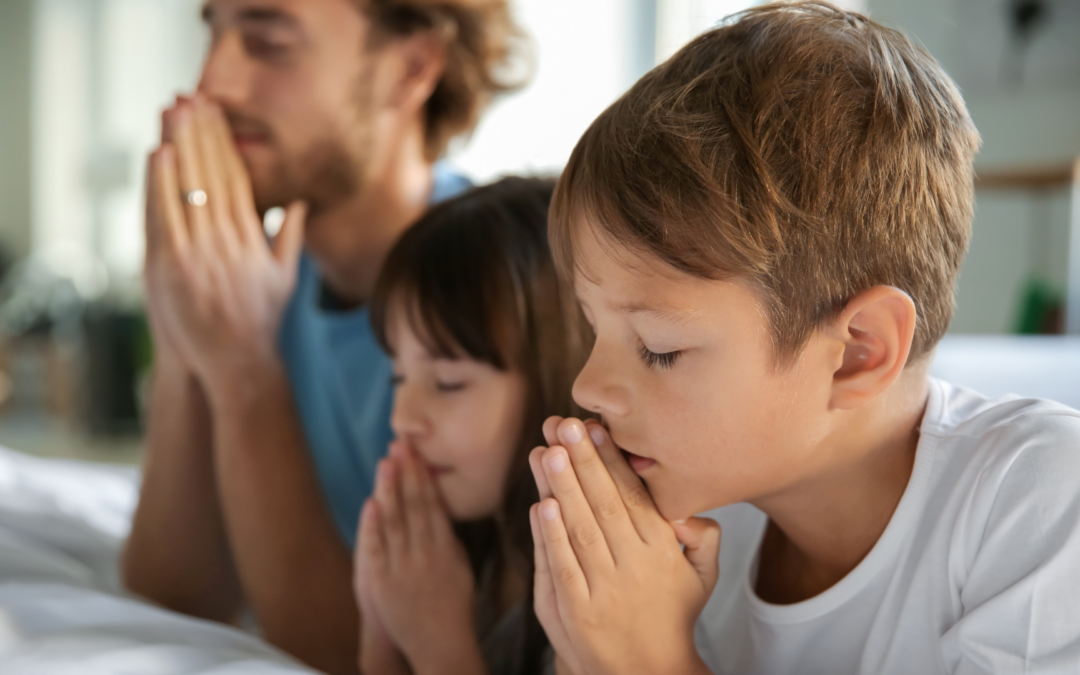What is Christ-Centered Homeschooling?
What does Christ-centered homeschooling mean? What do we mean when we say we are Catholic homeschoolers? How does being a Catholic homeschooler differ from being a non-religious homeschooler? How do our obligations to God and the Church figure into the way we structure our homeschooling routine?
These are all extremely important questions to consider, especially given the large number of homeschoolers who say the reason they homeschool is to provide a religious atmosphere for their children’s education. Elsewhere we have written about ways to incorporate religious devotions into your homeschooling day (see The Pious Homeschool); in today’s post, we consider the issue from more of a pedagogical standpoint, looking at how Christ-centered homeschooling can fundamentally shape your homeschooling experience.
Modeling Christ
If we want to offer a truly Christian education for our children, then it is of primary importance that we ourselves model Christ. Remember that the word Christian means “Christ-like.” We should be Christ-like in our homeschooling—primarily in how we interact with our children. This can be a challenge because homeschooling is sometimes stressful. But we can’t model Christ if we are constantly stressed, short-tempered, snappy, or impatient. Easier said than done, right?
Remember the fruits of the Spirit: love, joy, peace, patience, kindness, generosity, faithfulness, gentleness, and self-control (Gal. 5:22). This might seem like it doesn’t have very much to do with pedagogy, but I assure you it does. These traits are fundamental for the success of any teacher as they take on an added value in a Christian environment. A student’s ability to learn is closely tied to the teacher’s disposition.
Homeschooling is not simply a matter of “covering the material” in a given sort of time; it’s about giving your child a personalized approach to education that makes them feel loved while they are being educated. If you are having a hard time maintaining your peace throughout the day, take some time to reflect on what would make your day more peaceful. Then come up with some tangible steps to help you—even if it means you have to slow down or not “get as much done” in the day. Don’t stress about the big picture of keeping up with some semester schedule; “sufficient for the day is its own trouble” (Matt. 6:34).
The Catholic Curriculum
If you are Catholic homeschooling, a major reason for this is undoubtedly the ability to introduce religious ideals into your curriculum. For most of us, this will take the form of religious studies or catechism classes. Many Catholic homeschoolers study religion, theology, or apologetics as a formal part of their homeschooling education.
I would like to submit, however, that making a Catholic curriculum can go further than this. As I mentioned in the post “The Pious Homeschool,” it can take the form of devotions interspersed throughout the day. But it can also be structured into the curriculum in other ways. For example, in terms of what your student’s course of study looks like.
Traditionally, Catholic education follows a structure known as the Trivium and Quadrivium, also called “The Seven Liberal Arts.” In the Middle Ages, these consisted of grammar, logic, rhetoric, arithmetic, astronomy, music, and geometry. The purpose of this regimen was not to teach a specific skill, but to form the mind, making the student a capable and independent thinker. This sort of education was meant to fulfill the human potential of the student, to the glory of God and the betterment of the individual. Many great saints were formed in this tradition: St. Augustine, St. Alfred the Great, St. Thomas Aquinas and many more!
Today, this vision is at the heart of the classical curriculum, a modern approach to the liberal arts focusing on the humanities. If you use a classical curriculum, you are educating your children within a rich stream of Catholic tradition that has produced many saints and scholars over the centuries.
Character Formation
Christ-centered education also incorporates character formation because, after all, being a Christian is not simply about what we believe but how we live. In the New Testament, Christianity was referred to as a “way” of life (see Acts 9:1-2 and Acts 18:8-9). Homeschooling should be an opportunity to teach your children about what living as a Christian means. There are many facets to this. It may mean some formal instruction about the virtues or a class in ethics. Or it might include time dedicated to charity living out the corporal works of mercy. Another idea is some kind of mentorship with a trusted adult role model who can help your child grow in virtue through participation in work or some shared hobby. And it should always involve a regular sacramental life of Communion and Confession to encourage children to develop a wholesome Christian character.
Conclusion
Christianity is not merely about following rules. Our way of life is a person—Jesus Christ. Our education is Christ-centered to the degree we can keep it grounded in our Lord. What other ways have you found to make your homeschooling a truly Christ-centered experience?
What are your thoughts on this topic? I invite you to join me and other homeschooling parents at the Homeschool Connections Community or Facebook group!






